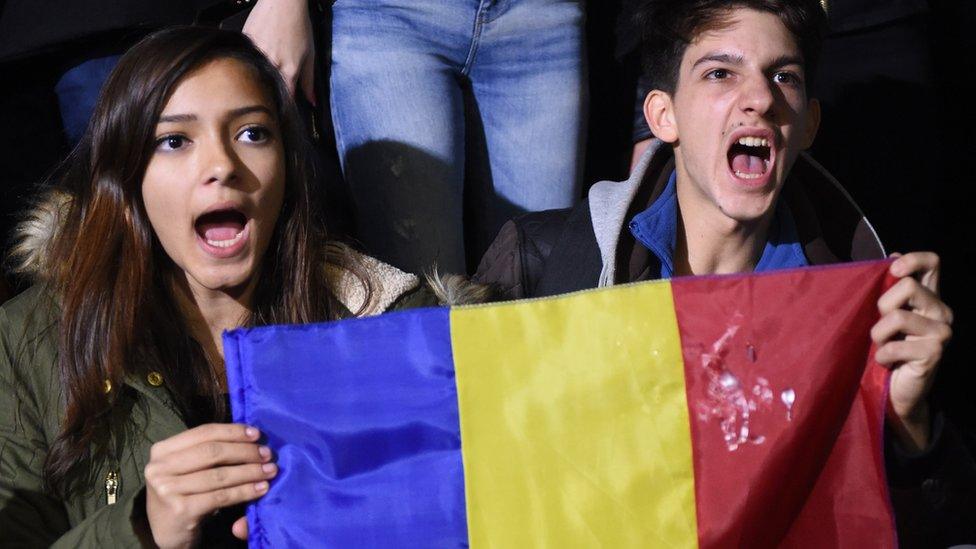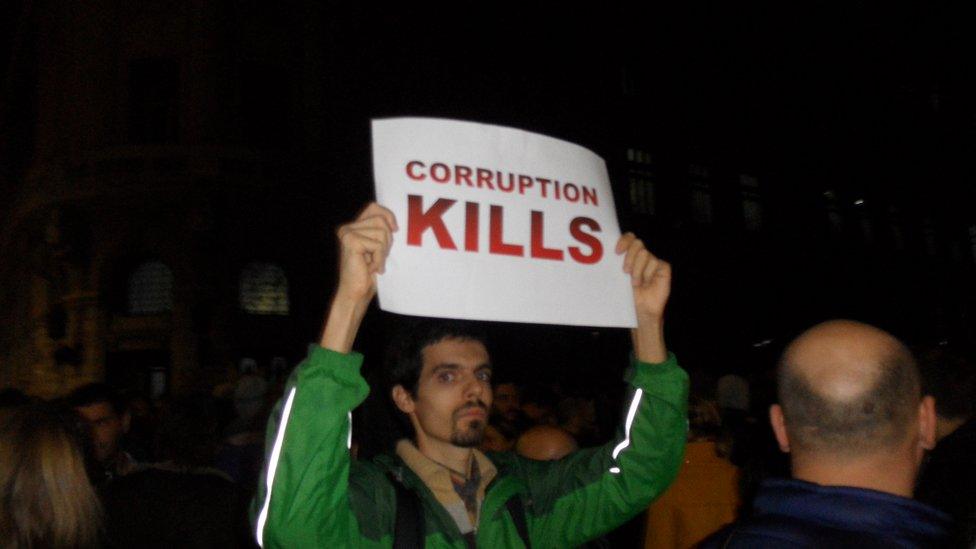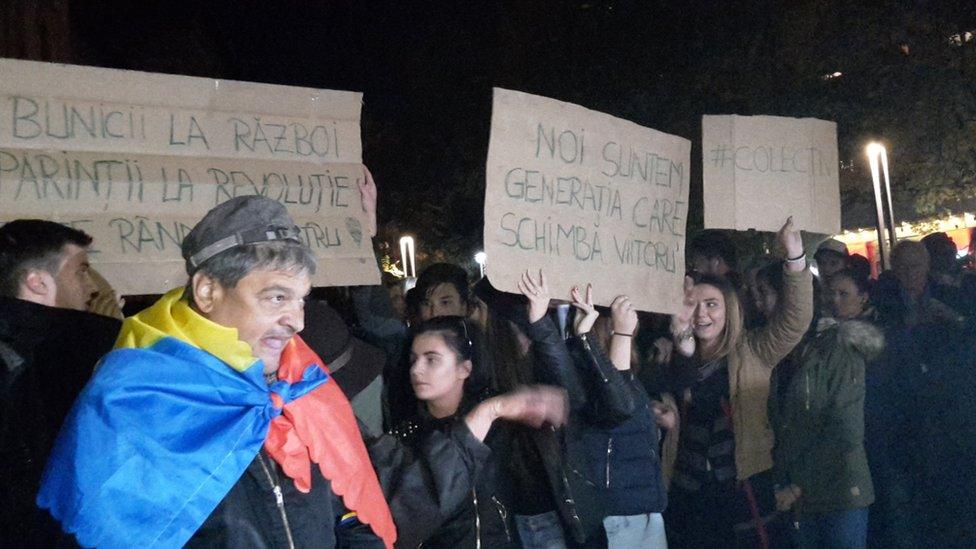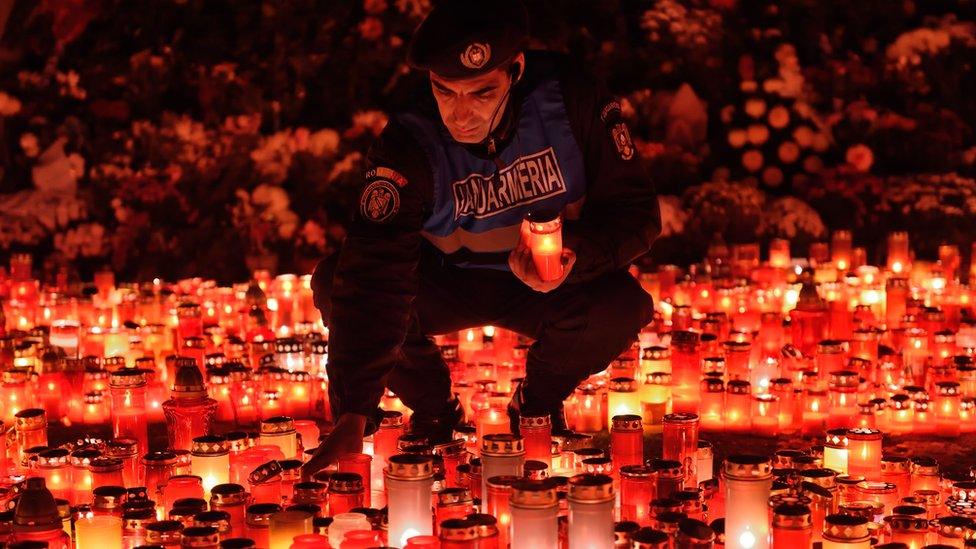Romania protesters prompt PM Ponta's fall after nightclub fire
- Published

The young protesters called for government resignations, blaming the nightclub fire on corruption
Victor Ponta announced his resignation hours after one of the biggest protests Romania's capital has seen in the past 25 years.
More than 20,000 people, most of them young, took to the streets of Bucharest, calling for him to go, days after the deaths of 32 people at a Halloween party at the Colectiv nightclub. The demonstration was one of the largest seen in Bucharest since the fall of communism in 1989.
"Down with Ponta", "Down with Oprea", "Down with Piedone", they chanted, singling out the prime minister, interior minister and a local mayor for blame.
Demonstrators say more marches are being planned across the country, as Ben Bland reports
Interior Minister Gabriel Oprea had been under pressure over the recent accidental death of a police outrider on duty in the minister's official motorcade. The mayor of the Bucharest district where the fire took place, Cristian "Piedone" Popescu, was accused of having illegally approved the opening of the club.
The prime minister and Mr Oprea were gone by midday and were followed shortly afterwards by a contrite Mr Popescu, who had previously said he felt no responsibility for the Colectiv Club tragedy.
The protesters shouted slogans such as "Corruption kills", alleging that the Colectiv club - a disused factory used as a nightclub venue - could only function because the owners had bribed the authorities.
Mr Popescu has denied the allegations. He had intended to run for mayor of Bucharest and replace Sorin Oprescu, the current mayor who is himself under investigation for alleged corruption.

Protesters blamed widespread corruption for Friday's deadly nightclub fire

They demanded resignations in response to the tragedy
The government on Tuesday adopted two emergency ordinances boosting the powers of the Emergency Situations Inspectorate (ISU) enabling it to close down clubs and restaurants which do not comply with fire regulations.
"We have increased fines from 2,500 lei (£400; $610), which was really nothing for a club, to between 30,000 and 100,000 lei. We have also made it a criminal offence," the deputy interior minister in charge of emergency situations, Raed Arafat, told the BBC.
"Do you want my honest opinion? It will only increase bribes," one protester said of the new measures.
'Sentiment of revolt'
More than 100 people are still in hospital, some of them in a critical condition, after suffering burns and poisoning in the 30 October fire. Doctors fear the toll could rise.
A young woman who lost two friends in the blaze was clearly angry.
"We, the young, are the future. That is what we were told, that is how we were educated. And when something very serious like that happens and young people die, we see it as an attack against us. Things must change and change must come from those who govern us," she said.

The number of deaths from the fire has gone up in recent days and hospital officials fear it could rise further
President Klaus Iohannis, a political opponent of the prime minister, expressed his support for the demonstrators on Facebook, declaring himself "impressed".
"The next step has to belong to the politicians who cannot ignore the sentiment of revolt expressed by the people," he said in a brief statement.
But many of the young people who backed Mr Iohannis in his race against Victor Ponta for president a year ago have been unimpressed with their head of state; a man they see as stand-offish and not forceful enough in his criticism of the government.
The demonstration brought back memories of other large-scale protests in the capital which also had significant repercussions.
A big protest in 1989 brought about the fall of Communist dictator Nicolae Ceausescu. And a year later demonstrators targeted then President Ion Iliescu, whom they accused of perpetuating the Communist regime.
"When I see these children demonstrating, many of them weren't born 25 years ago, I feel there is hope for the rebirth of this nation," one protest veteran said.